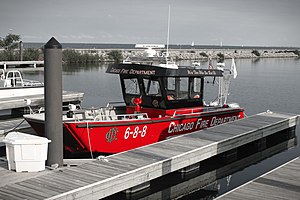As an important port city, Chicago has operated dedicated fireboats since 1877.[1][2]


In 1986, the Chicago Tribune offered a history of Chicago's larger fireboats, when the Chicago Fire Department moved the Victor L. Schlaeger from active to standby status.[2] According to that account, by 1908 the City was operating nine fireboats. However that was when many of the buildings that lined the waterfront were still made of wood, and by 1986 most of the factories and warehouses by the waterfront were built of concrete.
Josiah Seymour Currey, in a history of Chicago published in 1912, listed five fireboats operating in the early 1900s.[1]
By 1986 the city had introduced smaller, less powerful fireboats, that required smaller crews, and did not require specially trained and certified mariners to operate them.[2]
When she was commissioned in 2010, the Christopher Wheatley was Chicago's first full-size fireboat in sixty years.[3]
| name | commissioned | retired | notes | |
|---|---|---|---|---|
| Alpha | 1885 |
| ||
| Geyser | 1886 | |||
| Chicago | 188? | |||
| Yosemite | 1890 | |||
| Fire Queen | 1892 | 1905 |
| |
| Illinois | 1899 | |||
 |
Joseph Medill | 1908-06 | 1947-01 |
|
 |
Graeme Stewart | 1909 |
| |
 |
Fred A. Busse | 1937 | 1981 |
|
| Joseph Medill | 1948 |
| ||
 |
Victor L. Schlaeger | 1949 | 2010 | Built by Christy Corp, Sturgen Bay, WI. |
 |
fireboat 6-8-8 | |||
 |
Christopher Wheatley | 2010 |
| |
| Eugene Blackmon | 2017 |
References
edit- ^ a b c d e f g h i j
Josiah Seymour Currey (1912). "Chicago: its history and its builders, a century of marvelous growth (Volume v.2)". Clarke publishing Company. p. 39. Retrieved 2012-12-13.
All these so-called fireboats, however, were makeshifts. The Geyser was specially constructed as a river fireboat in 1886, chiefly through the earnest efforts of Fire Marshal Swenie. Swenie had been ordered to visit New York and other eastern cities to examine the fireboat service there. On his return the Geyser was built at an expense of $39,000. The Geyser was also used to open up the river in winter, and in 1887, she rendered splendid service in this way when the river was gorged with ice during the winter, and the flood of 1849 was likely to have been repeated.
- ^ a b c d e Andrew Siegel (1986-09-08). "Aging Fleet Of Fireboats Put Out To Pasture". Chicago Tribune. Archived from the original on 2013-12-13. Retrieved 2012-12-14.
- ^ a b Robert Allen (2011-06-15). "Christopher Wheatley: A Unique new Fireboat for the City of Chicago". Robert Allen, Architect. Archived from the original on 2012-01-03.
- ^ Bill Cosgrove (2010). "Chicago's Forgotten Tragedy". Author House. p. 118. ISBN 9781452079400. Retrieved 2013-12-10.
- ^ a b John F. Hogan, Alex A. Burkholder (2013). Fire Strikes the Chicago Stock Yards: A History of Flame and Folly in the Jungle. The History Press. p. 94. ISBN 9781609499075. Retrieved 2013-11-22.
In June 1908, Goodrich and Carney joined Busse, Horan and three dozen more Chicagoans on a day trip to Manitowoc, Wisconsin, to witness the launching of the new fireboat Joseph Medill. The Medill's twin, the Graeme Stewart stood alongside but was a bit further behind in construction.
[permanent dead link] - ^ "Joseph Medill". Shipindex.org. Archived from the original on 2013-11-23. Retrieved 2013-11-22.
- ^
Kelly Bauer (2017-07-31). "Seaplane Lands On Lake Michigan, Briefly Alarming The Fire Department". Chicago. Archived from the original on 2017-08-08. Retrieved 2017-08-07.
The boat was launched into the lake so the Blackmon family and fire officials could have a ride, Merritt said.
- ^
"New Chicago Fire Boat Named for Fallen Firefighter". Firehouse.com. 2017-08-06. Retrieved 2017-08-07.
The family of fallen Chicago firefighter Eugene Blackmon Jr. helped the department christen their new fast boat that carries his name.